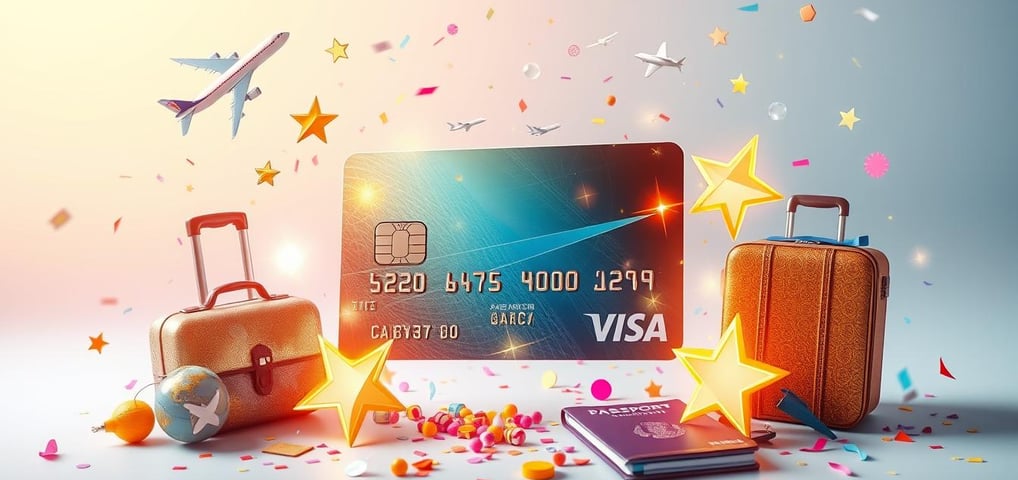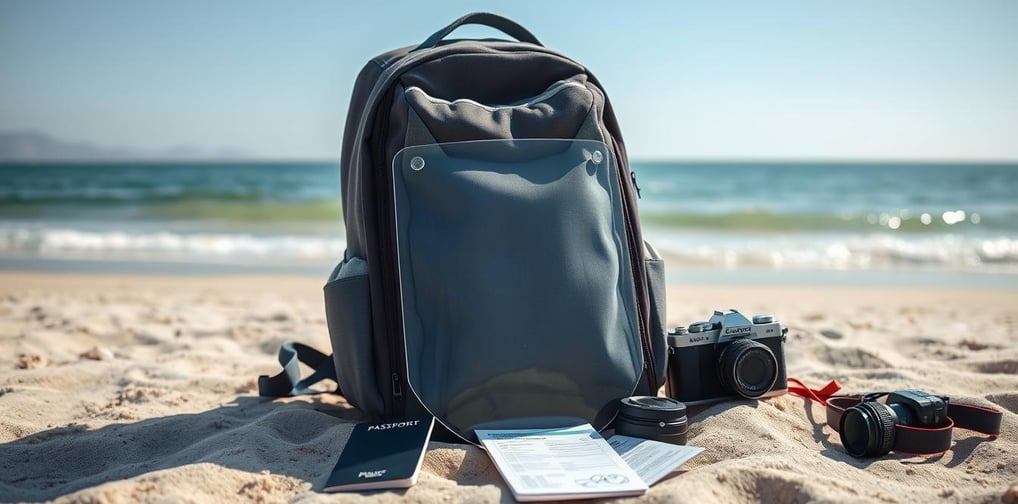The Best Travel Credit Cards to Fuel Your Adventures
Discover the best travel credit cards to maximize rewards, save on fees, and enjoy exclusive travel perks. Find the perfect card for your adventures
Finding a Good Travel Credit Card for the Travelers in You
Traveling the world is exciting and rewarding, but it can cost a lot. A good travel credit card can change that. It helps you earn more rewards and spend less.
Travel credit cards have many benefits. They let you earn airline miles or hotel points. They also offer travel protections and perks. By picking the right card, you can save money and make your trips more memorable.


Key Takeaways
Travel credit cards offer valuable rewards and benefits for frequent travelers
Understanding your travel habits and preferences is key to selecting the right card
Earning airline miles or hotel points can lead to significant savings on future trips
Travel credit cards often provide essential protections and perks, such as trip cancellation coverage and airport lounge access
Choosing a card with no foreign transaction fees can save you money when making purchases abroad
Understanding Travel Credit Cards
Travel credit cards are made for people who travel a lot. They offer special benefits and features. These cards have sign-up bonuses, no annual fees, and no foreign transaction fees.
These cards let you earn rewards on travel purchases. You can get points, miles, or cash back. This can be used for future travel costs. Some cards also give you perks like airport lounge access and travel insurance.
But, travel credit cards have their own fees and charges. Annual fees, balance transfer fees, and late payment penalties can add up. It's important to read the terms and conditions before signing up.
Knowing what travel credit cards offer can help you make smart choices. This way, you can get the most rewards while keeping costs down. This knowledge will help us find the best travel credit cards for you in the next sections.
Assessing Your Travel Habits
Choosing the right travel credit card starts with knowing your travel habits. This helps you find the card that fits your needs best. You'll get more value from your airline miles, hotel points, and other rewards.
Think about these important points:
How often do you travel, for work or fun?
Where do you usually go - within the country or abroad?
Do you mostly stay in hotels, fly with a certain airline, or mix it up?
Is it important to you to have perks like lounge access, travel insurance, and car rentals?
Do you like earning airline miles, hotel points, or a bit of both?
Knowing these answers will guide you to the right travel credit card. For example, if you fly often with one airline, a co-branded card is great. It lets you earn miles and enjoy special perks. On the other hand, if you travel differently and like options, a general rewards card might be better. It lets you use points for many travel costs.
Matching your travel card to your habits means you'll get more from your rewards. You'll enjoy your travels more, too.
Types of Travel Credit Cards
There are three main types of travel credit cards: airline-specific, hotel-branded, and general travel rewards cards. Each type has its own benefits and features. They cater to different travel needs and spending habits.
Airline-Specific Cards are for those who fly often with one airline. They offer perks like free checked bags and priority boarding. These cards give bonus miles for purchases with the airline.
Hotel-Branded Cards are for frequent guests of certain hotel chains. They provide benefits like room upgrades and late checkout. These cards are perfect for those who always stay at the same hotel.
General Travel Rewards Cards offer points or miles for various travel expenses. You can use them for flights, hotels, and more. This flexibility is great for those without a preferred airline or hotel.
Choosing the right travel credit card depends on your travel habits and spending. Look at the benefits, fees, and how you can use the rewards. This will help you find the best card for your needs.
Evaluating Fees and Charges
When picking a travel credit card, it's key to look at the fees and charges. Annual fees, foreign transaction fees, and balance transfer fees can really affect the card's value. Knowing these costs helps you choose wisely and make sure the card's benefits are worth the cost.
The annual fee is a big consideration. Many travel cards have an annual fee, which can be a few dollars or hundreds. Even though a high annual fee might seem scary, think about the card's benefits. Ask yourself if perks like airport lounge access, travel insurance, and bonus points are worth the fee.
Don't forget about foreign transaction fees. These fees are for purchases made outside your home country. If you travel a lot, these fees can add up. Look for cards that don't charge or charge less for foreign transactions to save money.
Also, think about balance transfer fees. If you plan to move a balance from another card, these fees can add up fast. Check if the savings from transferring a balance are worth the fees.
By carefully looking at the fees and charges of a travel credit card, you can make a better choice. The goal is to find a card that fits your travel and spending needs, without breaking the bank.
Understanding Travel Rewards Programs
Travel rewards programs can seem complex at first. But, learning the basics can open up a world of benefits for travelers. These programs work by giving you points or miles for every dollar you spend. You can then use these to book flights, hotel stays, car rentals, or even get cashback.
The main ways to use your points or miles include:
Booking travel through the program's portal
Transferring points to airline or hotel loyalty programs
Redeeming for statement credits or gift cards
Purchasing merchandise or experiences
To get the most out of your points or miles, it's key to know the redemption rates. Also, be aware of any blackout dates or restrictions. Some programs might offer better deals for flights, while others might be more flexible for cashback or merchandise.
By keeping up with your program's details, you can earn and redeem points or miles wisely. This can greatly enhance your travel spending. Whether you travel often or just occasionally, knowing how these programs work can save you money and lead to amazing experiences.
Introductory Bonuses and Promotions
Travel credit cards often come with great introductory offers. These include sign-up bonuses, welcome offers, and limited-time deals. They aim to attract new users and help cover the costs of these cards.
Smart travelers apply for these cards at the best time. This way, they can earn thousands of points or miles. They might also get waived annual fees or credits for travel expenses.
But, it's key to read the fine print. Many offers require you to spend a certain amount or meet a deadline. Keeping track of these details is important to not miss out.
Introductory offers are usually time-sensitive. So, it's important to act fast when you find a good deal. This way, you can start building your travel rewards and get more value from your card.


Credit Score Considerations
When you apply for a travel credit card, your credit score matters a lot. Different card issuers have different score needs, but usually, a score of 700 or higher is best. This is because your score shows how well you handle money, which lenders check to see if they should give you credit.
Getting a travel credit card can affect your score in two ways. First, applying for a new card might lower your score a bit because of the hard inquiry. But, using the card wisely can help your score grow. This is because making payments on time and keeping your balance low shows you're financially responsible.
Your credit history is key to getting the best travel credit cards. Lenders want to see you've managed credit well in the past. This means having a mix of credit types, low balances, and always paying on time. Keeping your credit in good shape helps you qualify for cards with great benefits.
In short, knowing how your credit score affects your chances with travel credit cards is crucial. Keeping your credit strong boosts your chances of getting the right card for you.
Comparing Interest Rates
When picking a travel credit card, the interest rate is key. The Annual Percentage Rate (APR) shows how much interest you'll pay on balances. Knowing the difference between variable and introductory rates helps you choose wisely.
Variable APRs change with the market, like the prime rate. This means your interest could go up or down. Fixed APRs stay the same, making your interest costs easier to predict.
Many travel cards offer 0% interest for 12-15 months. This is great if you'll pay off your balance before the offer ends. But remember, the regular APR kicks in after the promotion.
By comparing APRs, variable rates, and intro offers, you can pick the best card for you. This way, you'll pay less in interest and get more from your travel rewards.
Travel Insurance and Protections
When picking a travel credit card, think about the insurance and protection it offers. These benefits can give you peace of mind and valuable coverage on your trips. Let's look at the common types of travel insurance and protections found in many cards.
Trip cancellation insurance is a key benefit. It can refund non-refundable trip costs if you have to cancel or cut short your trip. This can happen due to illness, job loss, or natural disasters. Cards also offer baggage delay coverage. This helps if your luggage is delayed by your airline, providing funds for essential items.
Rental car insurance is another important protection. If you use your card to rent a car, you might get coverage for damage or theft. This can save you money, especially on long trips or with high-end rentals.
Travel credit cards also include extra protections. These include travel accident insurance, emergency medical and dental coverage, and concierge services. These can be lifesavers when unexpected things happen, letting you enjoy your trip without worry.
When looking at travel credit cards, check the insurance and protection benefits. Knowing what's covered can help you pick the right card for your travel needs. This way, you get the most value for your money.


Customer Service and Support
Travel credit cards with great customer service can be a game-changer. They offer 24/7 support, concierge services, and travel help. This ensures cardholders can handle any unexpected issues on the road.
Having 24/7 customer service is key for travelers. It helps with lost cards, billing problems, or travel emergencies. A good support team available anytime can give you peace of mind. Many cards also offer concierge services for booking flights, hotels, or restaurants, making planning easier.
Top travel credit cards also provide travel assistance. This includes:
Emergency travel help for medical or security issues
Trip cancellation and interruption coverage
Baggage delay and loss reimbursement
Car rental insurance and roadside assistance
These benefits help reduce stress and financial loss from travel problems. They are a must when choosing a travel credit card.
By focusing on customer service and support, travelers get the help they need. This makes their trips smooth, whether it's a small issue or a big emergency. The right travel credit card ensures a worry-free journey.
Cardholder Rewards and Perks
When picking a travel credit card, think about the extra rewards and perks. These can make your travel better. Cards often offer things like airport lounge access, Global Entry/TSA PreCheck credits, and priority boarding.
Airport lounge access lets you relax in a quiet space before flying. It's great for long layovers or delays. Global Entry/TSA PreCheck credits speed up security checks, saving time and stress.
Priority boarding means you board early. This ensures you have room for your luggage and can get settled quickly.
These perks can greatly improve your travel experience. So, compare the benefits of different cards before choosing.
Understanding Redemption Restrictions
Using a travel credit card comes with some rules. You might face blackout dates, limited seats, or restrictions on transferring points. These can affect how much value you get from your rewards.
Blackout dates are times when you can't use your rewards for travel. This usually happens during holidays or busy times. Make sure to check your card's rules to avoid these dates.
Seat restrictions can also be a problem. Some cards might only offer a few seats for flights. Or, they might not include all flights or routes. Always check seat availability before booking.
Blackout dates can restrict when you can redeem your rewards for travel
Seat restrictions may limit the flights or routes available for redemption
Transferring points to airline and hotel partners can provide more flexibility, but be aware of any limitations or fees
Transferring points to loyalty programs can give you more freedom. But, there might be limits or fees. Some programs might charge for transfers or have limits on points.


Knowing about redemption restrictions helps you plan better. It ensures you get the most out of your rewards. Keep these points in mind when picking a travel credit card.
Importance of Reporting Lost or Stolen Cards
Keeping your travel credit cards safe is key to financial security and peace of mind. It's vital to report a lost or stolen card right away. This action helps protect against fraud, gets you a new card, and covers you for unauthorized charges.
If your travel credit card is lost or stolen, tell the card issuer fast. Big credit card companies have teams ready to stop your card and give you a new one. This stops fraudsters and keeps you safe from big losses.
Fraud Protection: Credit card companies have strong fraud protection. Reporting a lost card quickly turns on these protections. This helps keep your money safe from fraud.
Emergency Card Replacement: Many travel cards offer quick replacement services. This is a big help if your card is lost or stolen. It lets you keep using your money without pause.
Liability Coverage: If someone uses your card without permission, your issuer might cover you. This is a big help if your card is stolen and used for big buys.
Knowing how to handle a lost or stolen travel credit card is crucial. It helps keep your money safe and lets you travel without worry.
Tips for Maximizing Your Travel Rewards
As a savvy traveler, you know how important it is to get the most out of your travel rewards. By using bonus categories, spending strategies, and points pooling, you can get more value from your travel credit card. Here are some practical tips to help you make the most of your travel rewards program.
Maximize Bonus Categories
Many travel credit cards give bonus rewards for certain purchases, like dining, travel, or gas. Find out the bonus categories on your card and spend more in those areas. This way, you can earn more points or miles, boosting your rewards.
Optimize Your Spending
There are more ways to optimize your spending besides bonus categories. Use features like automatic spending categorization to earn the most rewards on all purchases. Also, look for special promotions or partner programs to earn extra points or miles.
Take Advantage of Points Pooling
If you or your family members have travel credit cards, consider pooling your rewards points or miles. This strategy lets you combine points for more valuable rewards, like upgraded flights or luxurious hotel stays.
By following these tips, you can get the most out of your travel rewards program. Remember, staying informed and proactive with your spending and rewards management is key to maximizing your travel rewards.
Reading the Fine Print
When you pick a travel credit card, it's key to read the terms and conditions carefully. This step often gets missed but is crucial. It can show you important details that affect your rewards and card use.
Look closely at the terms and conditions, reward expiration rules, and annual fee waivers. These details can change how you use your card.
It's vital to understand the terms and conditions. These explain the rules and limits of your card's benefits. Make sure you know any restrictions on earning or using rewards, including blackout dates.
Also, check the reward expiration policies. Some cards have time limits for using your rewards. This could reduce the value of your points or miles. Find out how long your rewards last and how to keep them from expiring too soon.
Annual fees are common with travel cards, but some offer ways to avoid them. Look at the card's terms to see if you can get a annual fee waiver. This might depend on your spending or transactions.
Making the Final Decision
Choosing the right travel credit card can be tough. But with the right tools and info, you can make a smart choice. Start by using comparison tools to look at different cards' features, rewards, and benefits. Reading expert reviews can also give you insights into how good these cards are.
When deciding, think about how the card's rewards and redemption options match your travel and spending habits. Check if the annual fees, interest rates, and other charges are worth the benefits. Make sure the card's travel protections, like trip cancellation or delay coverage, meet your needs.
The best travel credit card for you is one that offers great value. By carefully looking at your options and focusing on what matters most, you can make a confident choice. This choice will improve your travel experiences and help you get the most financial benefits.
FAQ
What are the key benefits of using a travel credit card?
Travel credit cards offer many perks for those who travel often. You can earn rewards like airline miles and hotel points. They also provide travel perks and can help save money on trips.
How do travel credit cards differ from regular credit cards?
Travel credit cards are made for frequent travelers. They earn more rewards on travel purchases and offer special travel benefits. They often have an annual fee for these extra features.
How can I determine which type of travel credit card is best for my travel habits?
Think about your travel habits and preferences. Consider your favorite airline and hotel, how often you travel, and your spending. This will help you find the right travel credit card for you.
What are the different categories of travel credit cards available?
There are airline-specific, hotel-branded, and general travel rewards cards. Each type offers unique benefits and rewards. They cater to different travel needs and preferences.
What are the key fees and charges associated with travel credit cards?
Travel credit cards often have an annual fee. This fee can be low or high, depending on the card's features. Other fees include foreign transaction fees and balance transfer fees. It's important to consider these costs against the rewards and perks.
How do travel rewards programs work, and how can I maximize the value of my earned rewards?
Travel rewards programs let you earn points or miles for every dollar spent. You can redeem these rewards for travel expenses like flights and hotel stays. To maximize your rewards, understand redemption options and take advantage of bonus categories.
What types of introductory bonuses and promotions are commonly offered by travel credit cards?
Travel credit cards often have big sign-up bonuses. These can include a large number of points or miles after meeting a spending requirement. Timing your application for these offers can help you get the most value from the card.
How do credit score requirements and impacts factor into choosing a travel credit card?
Travel credit cards usually require good to excellent credit for approval. Using a travel credit card responsibly can help maintain or improve your credit score. This includes making on-time payments and keeping your credit utilization low.
What types of travel insurance and protection benefits are typically offered by travel credit cards?
Many travel credit cards offer valuable insurance and protection benefits. These include trip cancellation/interruption coverage and baggage delay insurance. These benefits can help protect you from travel-related risks and emergencies.
What customer service and support features are important to consider when choosing a travel credit card?
Good customer service and support are key. Look for 24/7 assistance, concierge services, and dedicated travel support. These can make your travel experience better and give you peace of mind.
What additional rewards and perks do travel credit cards often offer?
Travel credit cards may offer extra benefits like airport lounge access and Global Entry or TSA PreCheck fee credits. They can also provide priority boarding and other travel perks. These can enhance your travel experience.
What are some common redemption restrictions to be aware of with travel credit cards?
When redeeming travel rewards, be aware of limitations. These can include blackout dates and seat restrictions. Understanding these restrictions can help you plan and maximize your rewards.
Why is it important to report a lost or stolen travel credit card immediately?
Reporting a lost or stolen travel credit card quickly is crucial. It protects you from fraudulent charges and allows you to use the card issuer's fraud protection. It also ensures you can get a replacement card and coverage for unauthorized transactions.
How can I maximize the value of my travel rewards?
To maximize travel rewards, focus on earning bonus points in specific categories. Spend wisely to align with the card's rewards structure. You can also pool rewards with family members to reach redemption thresholds faster.
What should I look for when reviewing the fine print of a travel credit card?
When evaluating a travel credit card, carefully review the terms and conditions. Pay attention to details like reward expiration policies and any restrictions on benefits and rewards. This ensures you understand the card's full value.